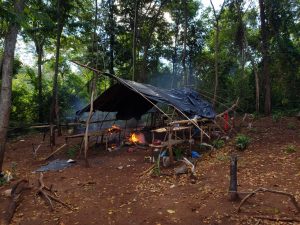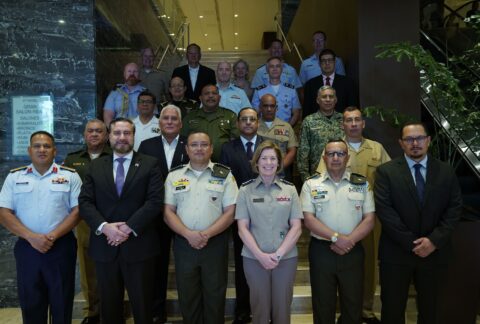The Paraguayan National Anti-Drug Secretariat (SENAD, in Spanish) concluded Operation New Alliance XXIV (Operación Nueva Alianza XXIV) with the destruction of 490 hectares of illegal cannabis crops in Amambay department, on March 8, 2021.
“The 490 hectares are equivalent to 1,470 tons of marijuana destroyed,” SENAD reported in a statement.

With the support of four helicopters of the Brazilian Federal Police, agents entered forest areas in Santa Ana, Colo’o, and Colonia Piray. In those locations, they destroyed 87 drug campsites, responsible for the early stages of the drug supply chain.
“It was worth working for 14 days to destroy the logistics of trafficking sources that support [drug] production,” SENAD said.
According to the Paraguayan Information Agency (IP, in Spanish), agents found water collection systems and hoses for irrigation. They also found rubber pots and partial shades used for germinating marijuana seedlings.
“With this, they are likely improving the processes for better ‘quality’ in their illicit products,” the IP agency reported.
SENAD also incinerated 14.7 tons of marijuana, including chopped and ready-to-pack forms of the drug.
“The presence of operational forces in territories affected by illicit crops is key and is also an ongoing challenge for Paraguay and Brazil, in the face of an activity highly connected with regional organized crime,” SENAD said.
Operation North Atlantic
During Operation North Atlantic (Operación Atlántico Norte) on February 24, SENAD agents carried out four raids on companies believed to be linked to the record 23-ton cocaine shipment to European ports.
Days before the operation, a shipment of 16 tons of cocaine was seized in the port of Hamburg, Germany, while another 7 tons were seized in the port of Antwerp, Belgium.
Criminals sent the cocaine in containers inside of paint cans, the Paraguayan newspaper ABC reported. Authorities are investigating whether the drug was loaded in Paraguay or in other transit ports on the way to Europe.
“Even though it is true that containers leave our country, the loading does not always take place here, in Paraguayan ports,” Minister of the Interior Arnaldo Giuzzio said, according to Reuters. “Oftentimes, [the shipments] are contaminated in other ports.”









